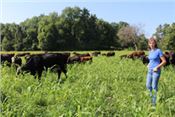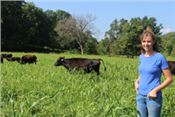|
MU Extension Specialist Wins National Conservation Award
DAVISVILLE, MO.
University of Missouri Extension specialist Rachel Hopkins received the first Conservationist of the Year Award from Women in NRCS (WIN).
Hopkins is an MU Extension county engagement specialist based in Potosi and a fourth-generation Crawford County cattle producer. WIN awarded Hopkins for her efforts to conserve and improve land and water on the 1,100 acres of pasture and timber that she and her father own. WIN is an organization founded by female employees of the USDA Natural Resources Conservation Service.
About four years ago, Hopkins committed to adding fencing and water to the family cattle pastures. She and her dad put in portable electric fencing and several thousand feet of permanent barbed and high-tensile electric wire to create paddocks for management intensive grazing (MIG) of their 150-head herd. Paddocks range from 1.5 to 25 acres.
They also laid 7,000 feet of pipe for watering systems and built ponds on hills where well water could not be pumped. Resources of several groups and programs, including the Crawford County Soil and Water Conservation District, Missouri Department of Conservation, and Ozark Land Trust, helped them to accomplish their goal.
The MIG system eases the workload and improves the land for generations to come, she says. "It's mutually beneficial for us and natural resources."
As part of the farm's ongoing conservation efforts, Hopkins keeps cattle away from the clear waters of Rock Branch, a tributary of the Huzzah River. The entire operation's fencing system excludes cattle from more than 4 miles of the Huzzah River and a couple tributaries.
They worked with the Nature Conservancy, Ozark Land Trust, Missouri Department of Conservation and a local landowner committee to obtain funds through the federal Natural Resource Damage Assessment (NRDA) program. The funds are from a legal settlement with southeastern Missouri lead mining companies. They can be used for conservation efforts and restoration of natural resources.
The NRDA funds helped pay for equipment and labor to remove timber and bury trees in the creek bank to slow erosion. Root wads face upstream to divert water and reduce sediment loss. This will stabilize 1,000 feet of creek bank when the project is completed in August.
Hopkins also works with USDA and the Missouri Department of Conservation to curb the feral hog problem in Missouri. She and her father trap and kill feral hogs on their property with assistance from USDA hog trappers. Feral hogs can carry diseases, damage property, and cause soil erosion and poor water quality when they wallow in the ground and streams. The elusive, aggressive hogs travel in groups. Ten hogs can root up to 10-20 acres per night.
“Feral hogs pose a huge threat to the ag industry in Missouri,” Hopkins says. The hogs are not native to the area. Game hunters may bring them into the area illegally, she says.
Hopkins began adding warm-season grasses to pastures in 2019. The native grasses extend the grazing season in rotational grazing systems and mitigate summer slump. Warm-season grasses also benefit wildlife habitat. Learn more at https://extension2.missouri.edu/programs/nrcs-mu-grasslands-project. ∆
 Rachel Hopkins, left, community engagement specialist with MU Extension, received the Conservationist of the Year award from the organization Women in NRCS. WIN President Sandi Kreke, right, presented the award.
Photo credit: MU Extension
Rachel Hopkins, left, community engagement specialist with MU Extension, received the Conservationist of the Year award from the organization Women in NRCS. WIN President Sandi Kreke, right, presented the award.
Photo credit: MU Extension
 Rachel Hopkins, right, and her father installed portable and permanent fencing and water sources for cattle.
Rachel Hopkins, right, and her father installed portable and permanent fencing and water sources for cattle.
They work with state and federal agencies to protect water quality and prevent erosion.
Photo credit: Photo by Linda Geist.

Rachel Hopkins, right, and her father own 1,100 acres of pasture and timber in Crawford County.
Photo credit: Photo by Linda Geist.
|
|